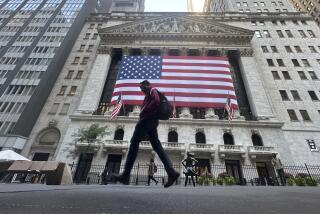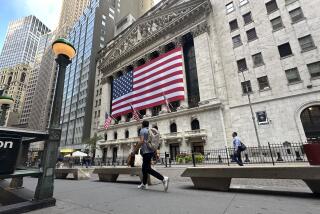Zooming Brokerage Stocks Hint Investors Still Bullish
- Share via
Brokerage stocks are zooming to new highs, a powerful indication that Wall Street’s bull market hasn’t yet run its course.
Merrill Lynch & Co. shares closed at $83.625 on Thursday, a gain of 75 cents for the day and a new high. The stock has jumped 24% from $67.25 in May.
Discount brokerage Charles Schwab Corp. also closed at a record high Thursday, surging $1.375 to $29.375. And Primerica Corp., which owns brokerage Smith Barney and will soon own Shearson as well, soared $1.75 to a record $53.50.
Historically, the brokers’ shares continue to rise so long as investors see the bull market advancing. This makes sense, of course, because brokerage earnings are directly dependent on the volume of stocks, bonds and mutual funds underwritten, sold and traded.
So, despite constant investor jitters that the stock market is primed to fall sharply, the action in the brokerage stocks suggests otherwise.
On average, the brokerage stocks peaked 23 weeks before the broad market in each of the last four major market tops (1981, 1983, 1987 and 1990), says Don Hagan, chief sector analyst at Ned Davis Research in Nokomis, Fla. Thus, even if this is the top for the brokerage shares, the stock market overall can still go higher.
“The new highs (in brokerage stocks) mean we have some breathing room” for the market, says Hagan.
Yet, there’s a troubling split between investors’ perception of the brokerage stocks and how Wall Street sees itself.
For the most part, Wall Street analysts who follow their own industry are convinced that the end of this financial services boom is near. “Business does not really get any better than the current environment,” argues Samuel Liss, brokerage analyst at Salomon Bros. in New York.
With short- and long-term interest rates at generational lows, investors’ appetite for stocks is unprecedented. Likewise, low rates are giving many companies and municipalities the opportunity to refinance debt at a record pace.
But once short-term interest rates begin to rise, the expectation is that many investors will forget stocks and bonds, to run back to short-term savings instruments.
That would hit brokerages on two fronts: Their lucrative underwriting revenue would dry up, because far fewer new stock and bond issues could be sold, and commission and trading revenue also would dive, as activity in securities markets dissipates.
Most analysts believe brokerage earnings will reach their cyclical peak this year. For example, Merrill Lynch is expected to earn $8.85 a share this year, up from $8.35 last year. But for 1994, analysts’ consensus estimate for Merrill drops to $7.53, according to earnings tracker Zacks Investment Research.
Likewise, Zacks shows earnings expectations of $3.83 a share for PaineWebber Group this year, falling to $3.37 next; for Schwab, the numbers are $1.47 and $1.34.
If the analysts are right, it makes little sense to buy brokerage shares now, because declining earnings will inevitably translate into lower brokerage stock prices. And because the market usually looks well ahead in pricing shares, an expected decline in 1994 earnings should begin to be reflected in brokerage stocks right about now.
With the stocks hitting new highs, however, it’s clear that many investors expect brokerage earnings to get even better in 1994. And working in investors’ favor is that Wall Street so far has been overly conservative about its own potential in this bull market.
For the second quarter ended June 30, for example, Prudential Securities analyst Larry Eckenfelder had expected Merrill Lynch to earn just $2 a share. By mid-June, Eckenfelder was forced to raise that figure to $2.40, citing better than expected investment banking and trading revenue.
Eckenfelder also raised his second-quarter estimate for Schwab to 45 cents from 33 cents a share, a not-insignificant boost of 36%.
Of course, a healthy second quarter provides no guarantee of improving business in the second half of the year. Just as the stock market can collapse in an hour, so can brokers’ revenue. These shares are extraordinarily volatile, which means that they have traditionally been more a trader’s vehicle than an investor’s core holding.
Consider the poor investors who bought Merrill Lynch shares in mid-1983, one year into the great bull market of the ‘80s. Merrill’s stock rocketed from a low of $10.50 in 1982 to a peak of $56.50 in mid-’83, as the bull market’s prospects appeared limitless.
But as trading slowed and the boom in new stock issues faded in the summer of ‘83, Merrill stock lost momentum in a hurry. And in fact, the stock did not rise above its ’83 peak again until late in 1991--even though the bull market ran strong until 1987, and then picked up and ran again from 1988 to mid-1990.
Scott Offen, who manages the Fidelity Select Brokerage stock mutual fund in Boston, makes no argument that brokerage stocks are cheap at current levels, even though they trade for just nine or 10 times earnings. Unusually volatile stocks like these always trade for low price-to-earnings ratios.
But Offen also says it’s not so far-fetched to suggest that the industry’s earnings can continue to rise in 1994. If Americans are in the midst of a secular shift away from simple savings and toward more complex investing, brokers will be the prime beneficiaries, he notes.
“If you really believe that we’re going to continue to have low inflation, low interest rates and a muddle-through economy, then brokerage earnings are going up from here,” Offen says.
“It takes a long time for middle America to get motivated,” he says. “But the longer this market goes on, more and more people are motivated to do something.”
Merrill’s Breakout
Merrill Lynch & Co. stock closed at a new all-time high of $83.625 on Thursday. But some analysts worry that Merrill and other brokerages are duplicating their 1983 surge--the stocks’ last hurrah until 1991.
Thursday close: $83.625
Source: Value Line Investment Survey
More to Read
Inside the business of entertainment
The Wide Shot brings you news, analysis and insights on everything from streaming wars to production — and what it all means for the future.
You may occasionally receive promotional content from the Los Angeles Times.










